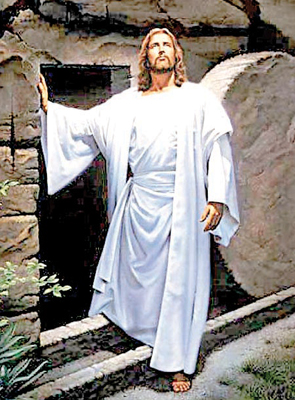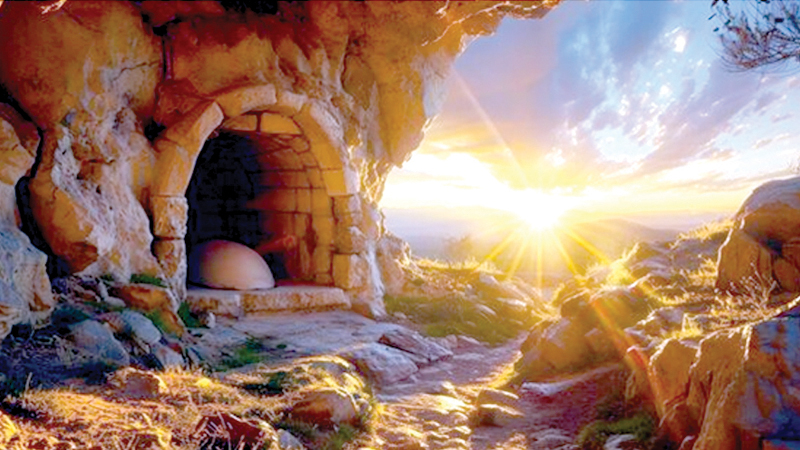The tomb lies bare, the stone is gone,
Night fades before the rising dawn.
No more shall death its shadow cast,
For life has bloomed, the storm is past…!
Easter Sunday, arriving not merely as a seasonal shift but as the incandescent dawn of an enduring hope, irrevocably alters the very fabric of human understanding. It is a day etched not just in calendars but in the soul of humanity, a Theological cornerstone proclaiming with an undeniable resonance the ultimate and eternal victory of life over the suffocating grip of death. Beyond the cherished traditions, the joyous gatherings, and the familiar symbols of renewal, Easter stands as a profound and multifaceted affirmation of the inherent beauty, the intrinsic dignity, and the sacred sanctity of every single human life – a profound truth intricately woven through the sacred tapestry of the Holy Scripture and echoing in the deepest yearnings of the human spirit.
The genesis of the Easter narrative lies submerged in the profoundest depths of human loss and despair. The agonising Crucifixion of Jesus Christ, as the Son of God, was a brutal and public spectacle of apparent finality, seemingly extinguishing the radiant light of love, compassion, and truth that He so powerfully embodied. His devoted followers were plunged into an abyss of inconsolable grief, their hopes and dreams seemingly interred alongside His broken and lifeless body.
Yet, it is precisely within this seemingly impenetrable darkness, in the very heart of this profound loss, that the transformative and life-affirming power of Easter spectacularly erupts. The startling discovery of the empty tomb, followed by the miraculous appearances of the Resurrected Christ, become the irrefutable and awe-inspiring testament to a reality that transcends the limitations of earthly existence: death, the seemingly ultimate and irreversible end, is demonstrably not the final word!
This pivotal and world-altering event carries an immense and far-reaching Theological weight, particularly concerning the inherent beauty that permeates all of human existence. Jesus’ earthly ministry was not merely a series of events but a vibrant and intricate tapestry meticulously woven with threads of profound compassion, miraculous healing, and transformative teaching. He possessed an unparalleled ability to perceive and celebrate the inherent worth and unique beauty in those whom society often marginalised, the outcasts, the forgotten, and the seemingly insignificant.
He found joy and profound meaning in the simple, everyday wonders of existence, from the communal breaking of bread and the sharing of parables to the quiet contemplation of the flowers of the field, whose beauty surpassed even the splendour of royalty (cf. St. Matthew 6:28-29). His glorious Resurrection serves as a powerful and enduring affirmation that this inherent beauty, this fundamental goodness that God has infused into His creation, is not fleeting or ephemeral but eternal and indestructible.
 It speaks to a God Who profoundly delights in His creation, Who imbues every facet of it with wonder, intricate detail, and purposeful design, and Who ultimately redeems it from the inevitable decay and brokenness brought about by sin and death.
It speaks to a God Who profoundly delights in His creation, Who imbues every facet of it with wonder, intricate detail, and purposeful design, and Who ultimately redeems it from the inevitable decay and brokenness brought about by sin and death.
As the insightful English poet, Gerard Manley Hopkins so eloquently penned, “The world is charged with the grandeur of God.” Therefore, Easter serves as a powerful and joyous reminder that this Divine grandeur is not lost or diminished but resurrected, renewed, and gloriously revealed in the Person of the Risen Christ.
The Easter narrative profoundly and unequivocally upholds the inherent dignity of every single human life. In a world too often scarred by injustice, marred by oppression, and characterised by the systematic devaluation of individuals based on arbitrary distinctions, the Resurrection resoundingly declares that every single human being, with no exception whatsoever, is of immeasurable and intrinsic worth in the eyes of God. Jesus, through His voluntary Incarnation – His willingness to fully embrace the entirety of the human experience, including the depths of suffering, the sting of betrayal, and the ultimate finality of death – profoundly identifies with our shared humanity.
Solitary victory
His subsequent Resurrection on the third day is not merely a personal triumph, a solitary victory over the grave, but a universal victory for all of humanity, a powerful and enduring promise that our own mortality does not negate our fundamental and God-given intrinsic value. As the Catechism of the Catholic Church beautifully articulates, “By his death, Christ has conquered death, and so has opened up for all men the possibility of salvation.” This profound salvation is not simply an ethereal escape from the trials and tribulations of earthly existence but a radical restoration of our inherent dignity as beings uniquely created in the very image and likeness of God (cf. Genesis 1:27).
The transformative event of the Resurrection signifies even in our deepest vulnerability, in our moments of profound brokenness, and in the face of our inevitable mortality, we are deeply loved, unconditionally redeemed, and ultimately destined for a share in God’s eternal glory.
As Pope Saint John Paul II eloquently stated in his Encyclical Evangelium Vitae, “Human life is sacred because from its beginning it involves the creative action of God and remains forever in a special relationship with the Creator, Who is its sole end. God alone is the Lord of life from its beginning until its end: no one can under any circumstance claim for himself the right directly to destroy an innocent human being.” Easter resoundingly affirms this profound truth!
The very sanctity of human life finds its ultimate and unshakeable grounding in the core narrative of Easter. The Resurrection powerfully underscores the sacredness and inviolability of human existence, extending from the moment of conception to the natural end of life’s earthly journey. If death itself, the seemingly ultimate and most fearsome earthly power, has been definitively defeated and rendered powerless, then life itself is undeniably imbued with an inviolable holiness, a sacredness that demands our utmost reverence and protection.
The selfless Sacrifice of Christ on the Cross and His subsequent glorious Triumph over death serve as a powerful testament to the immeasurable preciousness of each and every moment, each and every breath that we are granted.
It issues a profound and unwavering call to us to reverence life in all of its diverse forms, to actively protect the most vulnerable members of our society, and to tirelessly work towards the creation of a better world where the inherent dignity of every single person is not only recognised in word but also consistently and actively upheld in deed.
As the renowned and deeply inspired Theologian Karl Barth so powerfully wrote, “The Resurrection of Jesus Christ is the decisive event in the whole of history, the one event which shows that God has said ‘Yes’ to man and to his life.” This Divine and resounding ‘Yes’ echoes through the corridors of time, challenging each and every one of us to reflect that same profound affirmation in our own personal interactions, in the structures of our societies, and in the policies that govern our world.
Transformative power
The profound and transformative implications of Easter extend far beyond the sacred walls of our churches and the confines of our personal faith. It issues a compelling and urgent call to each of us to live lives that authentically reflect the spirit and the transformative power of the Risen Lord and Saviour Jesus Christ – lives that are indelibly marked by acts of selfless love, profound compassion, unwavering justice, and a deep and abiding respect for the inherent worth and dignity of every single human being we encounter.
It relentlessly challenges us to actively confront and dismantle the myriad forces in our world that diminish human life, whether they manifest as the crushing weight of poverty, the destructive scourge of violence, the insidious poison of discrimination, or the careless neglect of our shared planet, our common home entrusted to our care.
The radiant hope that emanates from the empty tomb empowers us to become active agents of positive transformation in the world, to tirelessly work towards the realisation of a world where the breathtaking beauty of God’s creation is cherished and nourished, where the inherent dignity of every individual is not only recognised but actively honoured and celebrated, and where the fundamental sanctity of all human life is held as an unshakeable and non-negotiable principle.
Timeless message
In the insightful and profoundly hopeful words of Archbishop Desmond Tutu, a man who embodied the spirit of Resurrection in the face of immense adversity, “Easter says you can put truth in the grave, but it won’t stay there.” This powerful and enduring statement beautifully encapsulates the timeless and transformative message of Easter. It is a message of unwavering hope that transcends the deepest despair, a message of boundless love that ultimately conquers the most entrenched hatred, and a message of eternal life that definitively triumphs over the seemingly insurmountable power of death.
As we and countless others across the globe, joyfully celebrate the sacred occasion of Easter Sunday, let us not only rejoice in the miraculous Resurrection of Jesus Christ, but also consciously and deliberately rededicate ourselves to actively upholding the beauty, dignity, and, sanctity of all human life, reflecting the radiant and transformative hope that first dawned on that glorious Easter morning.
May the unfolding bloom of spring in our surroundings serve as a constant and beautiful reminder of the eternal life that has been so generously offered to each and every one of us, a life that is truly worth living fully, authentically, and with the deepest reverence for the gift for what it is…!
A Blessed Easter…! Alleluia!









